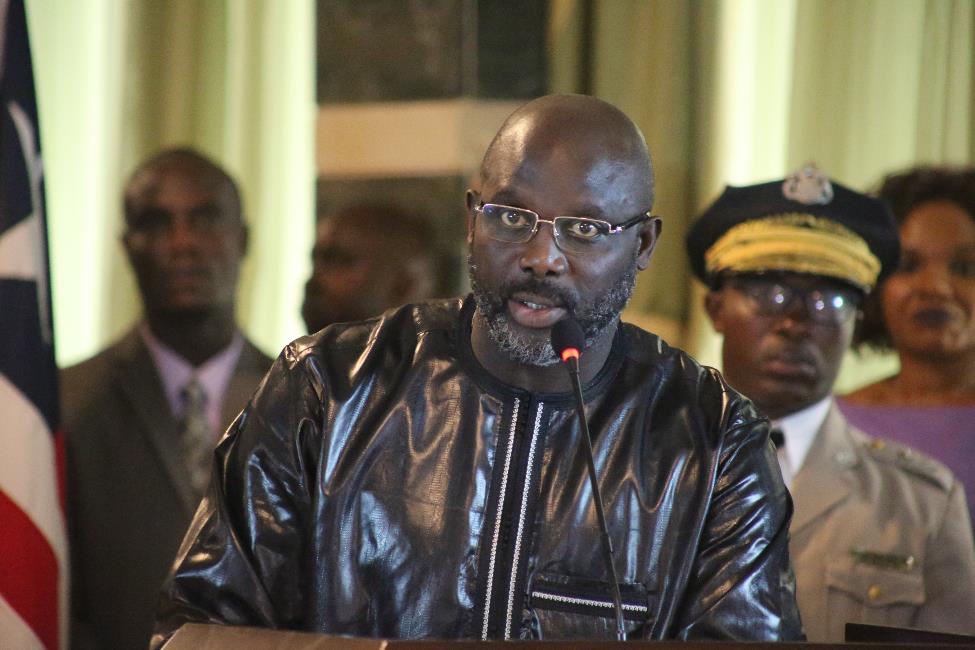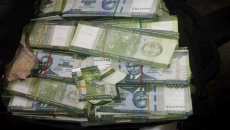MONROVIA, Montserrado – President George Weah has disclosed that the government will infuse US$25 million into the country’s economy as a measure to strengthen the Liberian dollar currency amid the continuous decline in the value of the local currency.
Weah made the pronouncement on Monday while addressing the nation on the growing economic depression. However, he did not disclose exactly how the amount would be infused into the economy or where the money would come from.
The Liberian economy has been free falling, as the currency exchange rate between the U.S. dollar and the Liberian dollar has reached its highest peak in history and continues to increase, making life difficult for poor citizens whose earnings are mainly in the local currency.
The cost of services and commodities have also similarly increased as the value of the Liberian dollar increasingly reducing on the market.
Weah said the current decline in the economy is not a new development for Liberia, as the situation existed when he decided to run as president.
“We were very aware of these systemic problems when we decided to run for the high office of president of Liberia, and so we are not surprised. And we are fully aware that we were elected with the expectation that we will solve these challenges,†he said.
He said the Liberian dollar has also been on a consistent depreciating trend and price increase since 2016, as according to him, the local currency had depreciated by 25 percent in December 2017. He said the currency experienced further depreciation by an additional 25 percent January this year.
“This recent depreciation in the value of the Liberian dollar has increased inflation by 4 percentage points to 21 percent, from 17 percent back in February 2018,†he said.
“I am fully aware of the negative impact of the declining exchange rate on the economic well-being of the Liberian people, and the serious hardship that this is beginning to cause. Let me assure you, that government has resolved to take the necessary and urgent measures to address the situation.â€
He, meanwhile, provided that the Central Bank has also been mandated to provide more effective supervision and regulation of foreign exchange bureaus and to provide more robust oversight of banks under its supervision, while also conducting a comprehensive review of regulations on the hoarding of both currencies outside the banking system. The Bank would provide incentives and safeguards to encourage the utilization of the banking system, including financial instruments.
The president disclosed that the government would engage the minds of “the best and the brightest†Liberian economists, both here and abroad, to seek solutions of stabilizing the economy.
“We will also seek advice and active support from our international partners,†he said, adding that “the above measures and many more currently being considered are critical steps toward the goal of arresting the rapid deterioration of the Liberian dollar.â€
He said, however, the ultimate solution for strengthening the Liberian dollar is to ensure domestic economic competitiveness and the existence of a strong private sector that is oriented towards domestic consumption, import substitution, and export.  “This is a goal we seek to achieve in the Pro-Poor Agenda for Prosperity and Development,†he noted.
According to the Liberian leader, the road to this transformation will be long, and sometimes difficult, thus requested for citizens to be patient.
“We fully understand the urgency and critical nature of the situation, and we are fully focused [on] trying to solve these problems, some of which have existed for many decades. Let us all work together to lift our people out of poverty,†he said.
“We will confront the challenges that have defied us for generations, with strong resolve, and together, we will overcome them, and move on to achieving even greater things for all Liberians.â€
With the measures to resuscitate the economy, the president said the government’s Economic Management Team would give bi-monthly updates on the state of the economy.
“We, therefore, call for your understanding, cooperation, collaboration, and patience. Better days lie ahead,†he disclosed.
Weah was overwhelmingly elected in December 2017 on the slogan “Change for Hope.†His election raised the hope of many, especially those of the lowest economic class. Upon taking office, the Liberian leader promised that his administration would operate under a “pro-poor†development agenda.
However, nearly six months into his administration, the president noted in his address that the pro-poor agenda is still being formulated. He said when it is completed, the agenda will be supported by a strategic implementation plan.
“The development strategy, to be known as the Pro-Poor Agenda for Prosperity and Development, is nearing completion, and will very shortly be presented to all stakeholders, including our foreign development partners, the private sector, and the general public, for consultation, input, and buy-in, before being finalized into a strategic implementation plan,†he said.
According to him, the development strategy and implementation plan will serve as a roadmap for the urgent and important next-steps to be taken in giving direction to economic recovery and will consist of short-term interventions, medium-term reforms, and long-term restructuring of the economy.
Although he also promised to also narrow the gap between the rich and the poor by ensuring that public resources do not end up in the pockets of government officials, the president is yet to take the lead for his officials by declaring his assets to the Liberia Anti-Corruption Commission in line with the Code of Conduct.
In his speech, he reiterated earlier pronouncements that he inherited an economy that was weak and under-performing, thus burdening the government with solvency and liquidity challenges, including a rapid and unprecedented depreciation that contributed to the rising inflation.
He said unemployment at the time was already very high, and the country’s foreign reserves at an “all-time†low.
Amid the “bleak situation†it inherited, Weah said it is not for the current administration to complain or to cast blame on previous administrations, but that it was the duty and responsibility of his administration to find new and sustainable solutions.
“I am fully aware that we are faced with a very difficult macroeconomic situation in Liberia. For many decades, we have incurred trade deficits because we import more than we export,†he said.
“We also have an economy based on traditional exports such as iron ore, rubber, coffee, etc., which are shipped to foreign buyers in their raw state, without any value-added propositions which could have also contributed significantly to industrialization and employment.â€
He said the prices and demand for Liberia’s exports are determined and affected by factors that are beyond its borders and control. Weah added that because of the new economic challenges affecting the global market, trade wars between the major manufacturing countries could also reduce demand and place downward pressure on the prices of the country’s major export. He said, at the same time, negative impact on real estate and inflows into the economy of the U.S. dollars spent by former UNMIL peacekeepers whose mission recently came to an end peacekeeper also plays a significant role.
Meanwhile, the Liberian leader said finding lasting solutions to the present macroeconomic challenges will take require additional time some time as only a structural transformation of the economy will produce sustainable recovery and growth.
“The key to success in this endeavor is for Liberians to produce more goods and services locally, so that we reduce our importation of goods and services from abroad, whilst at the same time increasing our exports and adding value to the raw materials that we ship to the world,†he said.
He said the government intends to embark upon a major push to ensure that Liberia becomes more competitive regarding domestic production, as a means of finding a sustainable solution to the huge economic challenge.
“And in so doing, we intend to encourage and empower Liberian businessmen and Liberian-owned businesses to lead the transformation of the Liberian economy. We will enable them to become more competitive, by providing affirmative policies and support, including ready access to finance and expertise.â€
The government’s goal is to encourage import substitution and manufacturing for export, as well as sustainable wealth and job creation, which it termed as a medium-to-long term solution.
“To lessen the immediate negative impact on our people, it will be an urgent imperative to devise and implement short-term fixes to the current problem,†the president also said.
He said while the fall in the prices of traditional exports and the UNMIL drawdown have contributed significantly to the current economic situation, the administration believes that a stronger and more aggressive enforcement of monetary policy, along with relevant fiscal instruments, would provide long-term solutions.
Featured photo courtesy of the Executive Mansion



